Before the Next Thing
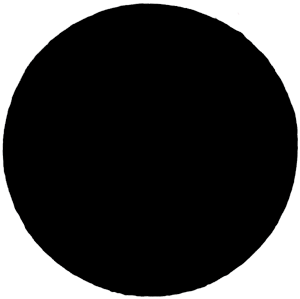 The moon will be dark tonight (a New Moon), which I take as a reminder to notice — and to celebrate — the disappearance of things…..the silence, the darkness, the emptiness that holds the space for the next new thing.
The moon will be dark tonight (a New Moon), which I take as a reminder to notice — and to celebrate — the disappearance of things…..the silence, the darkness, the emptiness that holds the space for the next new thing.
In honor of which I offer this poem:
The Art of Disappearing
by Naomi Shihab Nye
When they say Don’t I know you?
say no.
When they invite you to the party
remember what parties are like
before answering.
Someone telling you in a loud voice
they once wrote a poem.
Greasy sausage balls on a paper plate.
Then reply.
If they say We should get together
say why?
It’s not that you don’t love them anymore.
You’re trying to remember something
too important to forget.
Trees. The monastery bell at twilight.
Tell them you have a new project.
It will never be finished.
When someone recognizes you in a grocery store
nod briefly and become a cabbage.
When someone you haven’t seen in ten years
appears at the door,
don’t start singing him all your new songs.
You will never catch up.
Walk around feeling like a leaf.
Know you could tumble any second.
Then decide what to do with your time.
Thirteen Ways of Looking
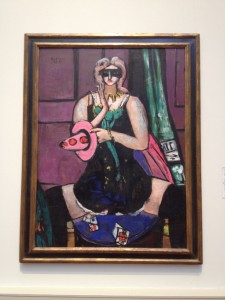 I’ve started, again, to do a different sort of contemplative practice, one that I’ve done a couple of time during the last two years.
I’ve started, again, to do a different sort of contemplative practice, one that I’ve done a couple of time during the last two years.
Here’s the practice: I go to the Art Museum, choose a piece of art (or rather, let a piece of art choose me), then I look at it….closely, carefully, contemplatively…then I write a couple of pages in my journal — whatever comes to mind — beginning with the phrase: “Now I see…”
And then I go back, a week or so later, and I do it again. And then again. And again. And again. Until I’ve done it thirteen times. (Thirteen being chosen with a nod to the enigmatic poem by Wallace Stevens, Thirteen Ways of Looking at a Blackbird.)
It’s amazing how differently I can see the “same” piece of art from one week to the next. Or maybe what’s so amazing is that I can still feel like it’s the same “me” that is seeing the same “it” again and again. When clearly neither of us are the same!
I’ve posted some of my previous experience with this practice here. And here, here, and here. Each of those posts were in response to looking at the well-known Guanyin statue we are SO fortunate to have right here in the St. Louis Art Museum.
But for this round of practice, I’ve chosen a subject that’s a bit more…hmm, what should I say….secular. It’s Max Beckman’s Carnival Mask, Green, Violet, and Pink, painted in 1950 (the year I was born).
I won’t post what I wrote in my journal just yet. Instead, I leave you with the first stanza of the afore-mentioned Wallace Stevens poem:
Among twenty snowy mountains,
The only moving thing
Was the eye of the blackbird.
Everywhere We Look
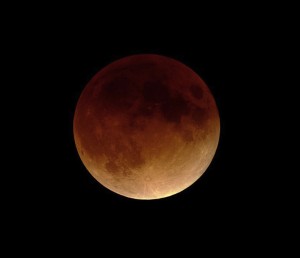 The moon was beautiful last night.
The moon was beautiful last night.
Maybe you missed it, but if you were outside you probably didn’t, because it was so big and bright. And beautiful. In fact, it was SO beautiful that perfect strangers stopped in the middle of the street and pointed it out to each other. (I was one of them!)
And then early this morning, there was a total eclipse. A “blood moon” in which, thanks to refraction by the earth’s atmosphere, both the eclipse and the rising sun could be seen simultaneously.
What an amazing and beautiful world we live in.
In honor of which, I offer this excerpt from “Gravel,” by Mary Oliver. (The entire poem can be found here.)
It is the nature of stone
to be satisfied.
It is the nature of water
to want to be somewhere else.
Everywhere we look:
the sweet guttural swill of the water
tumbling.
Everywhere we look:
the stone, basking in the sun,
or offering itself
to the golden lichen.
It is our nature not only to see
that the world is beautiful
but to stand in the dark, under the stars,
or at noon, in the rainfall of light,
frenzied,
wringing our hands,
half-mad, saying over and over:
what does it mean, that the world is beautiful–
what does it mean?
Winged Energy of Delight
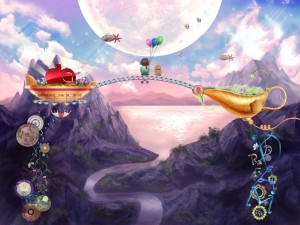 Over the weekend I listened to a wonderful talk by Phillip Moffitt given at the retreat that’s going on at Spirit Rock right now. I love the title of the talk — Getting Our Ducks in a Row: Sattipatana and the Seven Factors of Awakening.
Over the weekend I listened to a wonderful talk by Phillip Moffitt given at the retreat that’s going on at Spirit Rock right now. I love the title of the talk — Getting Our Ducks in a Row: Sattipatana and the Seven Factors of Awakening.
There’s a lot of humor in this talk, which focuses primarily on the happy and enjoyable aspects of the practice listed in the Factors of Awakening…as opposed to the Hindrances, which are the difficult states, and which often seem to get a lot more of our attention!
One translation of these Seven Factors are: Mindfulness (sati), Curiosity (dhammacicaya), Energy (viriya), Delight (piti), Calm (passaddhi), Collected Attention (samadhi), and Peace (upekkha).
It’s a very enjoyable talk as you might image, given the topic. (Click here to listen.) Towards the end, he quotes a poem by Rilke that I haven’t heard him use before. It’s called As Once the Winged Energy of Delight:
As once the winged energy of delight
carried you over childhood’s dark abysses,
now beyond your own life build the great
arch of unimagined bridges.
Wonders happen if you can succeed
in passing through the harshest danger;
but only in a bright and purely granted
achievement can we realize the wonder.
To work with Things in the indescribable
relationship is not hard for us;
the pattern grows more intricate and subtle,
and being swept along is not enough.
Take your practiced powers and stretch them out
until they span the chasm between two
contradictions….For the god
wants to know himself in you.
Mysterious, But Not Magical
 I listened to a talk by Phillip Moffitt last night, given at the opening of a retreat being held right now at Spirit Rock. The talk is primarily an overview of the practice, with particular emphasis on the “non-doing” aspect of what we’re “doing” when we practice. We practice with intention. But what happens as a result of our practice, is beyond our control.
I listened to a talk by Phillip Moffitt last night, given at the opening of a retreat being held right now at Spirit Rock. The talk is primarily an overview of the practice, with particular emphasis on the “non-doing” aspect of what we’re “doing” when we practice. We practice with intention. But what happens as a result of our practice, is beyond our control.
“It’s so mysterious,” he says, “but it’s not magical.”
By which I take him to mean that the practice unfolds in an orderly fashion, but not of an order that is easy to discern.
“We sit in stillness, without expectation,” he says. “And all eventually opens of its own accord.”
At the end of the talk, Phillip reads a passage from the Four Quartets, by T.S. Eliot. He says that these are the lines that during a very difficult time of his life — which lasted for a couple of years — gave him the presence to continue:
“I said to my soul, be still, and wait without hope
For hope would be hope for the wrong thing; wait without love
For love would be love of the wrong thing; there is yet faith
But the faith and the love and the hope are all in the waiting.
Wait without thought, for you are not ready for thought:
So the darkness shall be the light, and the stillness the dancing.”
***
Click here to listen to the talk.
Fire Element
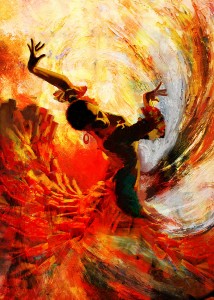 There is another method for contemplating the body that is given in the Satipatthana Sutta and discussed in Chapter 10 of Joseph’s Mindfulness book. The instructions are to experience all sensations of the body as being made up of the Earth Element (hardness/firmness), the Water Element (fluidity/cohesiveness), the Fire Element (heat/cold), and the Air Element (movement/pressure).
There is another method for contemplating the body that is given in the Satipatthana Sutta and discussed in Chapter 10 of Joseph’s Mindfulness book. The instructions are to experience all sensations of the body as being made up of the Earth Element (hardness/firmness), the Water Element (fluidity/cohesiveness), the Fire Element (heat/cold), and the Air Element (movement/pressure).
It’s a very interesting practice, which I won’t go into in depth here. (For that, check out the book!) Instead, I leave you with this poem. It doesn’t really have anything to do with the practice. Except, perhaps, as an inspiration!
Spanish Dancer
by Rainer Maria Rilke, translated by Stephen Mitchell
As on all its sides a kitchen-match darts white
flickering tongues before it bursts into flame:
with the audience around her, quickened, hot,
her dance begins to flicker in the dark room.
And all at once it is completely fire.
One upward glance and she ignites her hair
and, whirling faster and faster, fans her dress
into passionate flames, till it becomes a furnace
from which, like startled rattlesnakes, the long
naked arms uncoil, aroused and clicking.
And then: as if the fire were too tight
around her body, she takes and flings it out
haughtily, with an imperious gesture,
and watches: it lies raging on the floor,
still blazing up, and the flames refuse to die–.
Till, moving with total confidence and a sweet
exultant smile, she looks up finally
and stamps it out with powerful small feet.
Always Stillness, Always Movement
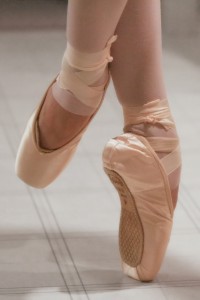 Today’s post is prompted by an interesting email conversation I had the other day with one of my Dharma buddies (thanks, Lori) about the practice of turning one’s attention to the open, spacious, stillness of mind. If you are at all interested in this practice, listen to the last 5 minutes of this talk given by Phillip Moffitt at the recent Concentration Retreat.
Today’s post is prompted by an interesting email conversation I had the other day with one of my Dharma buddies (thanks, Lori) about the practice of turning one’s attention to the open, spacious, stillness of mind. If you are at all interested in this practice, listen to the last 5 minutes of this talk given by Phillip Moffitt at the recent Concentration Retreat.
“There is always stillness,” Phillip says, “and there is always movement.”
T.S. Eliot says it like this:
At the still point of the turning world. Neither flesh nor fleshless;
Neither from not towards; at the still point, there the dance
is,
But neither arrest nor movement. And do not call it fixity,
Where past and future are gathered. Neither movement
from nor towards,
Neither ascent nor decline. Except for the point, the still
point,
There would be no dance, and there is only the dance.
— from Burnt Norton, I, Four Quartets
Mysterious Encounter
 I can’t seem to find the recording of one of Phillip Moffitt’s talks from the Concentration Retreat, in which he opened (and closed) by reading a poem by Rilke (not the one I posted on Friday). The poem is strange and dark — but beautiful — and it has stayed with me whenever I sit. I can often “hear” Phillip’s voice saying, “notice the breath as it arises out of stillness….and returns to stillness….notice the spaciousness between the breaths….the emptiness….and the arising out of emptiness…”
I can’t seem to find the recording of one of Phillip Moffitt’s talks from the Concentration Retreat, in which he opened (and closed) by reading a poem by Rilke (not the one I posted on Friday). The poem is strange and dark — but beautiful — and it has stayed with me whenever I sit. I can often “hear” Phillip’s voice saying, “notice the breath as it arises out of stillness….and returns to stillness….notice the spaciousness between the breaths….the emptiness….and the arising out of emptiness…”
When I find the talk, I’ll post a link. In the mean time, here’s the poem:
Sonnets to Orpheus, Second Part, No. XXIX
by Rainer Maria Rilke, translated by Stephen Mitchell
Silent friend of many distances, feel
how your breath enlarges all of space.
Let your presence ring out like a bell
into the night. What feeds upon your face
grows mighty from the nourishment thus offered.
Move through transformation, out and in.
What is the deepest loss that you have suffered?
If drinking is bitter, change yourself to wine.
In this immeasurable darkness, be the power
that rounds your senses in their magic ring,
the sense of their mysterious encounter
And if the earthly no longer know your name,
whisper to the silent earth: I’m flowing.
To the flashing water say: I am.
You Invisible Poem!
 Sonnets to Orpheus, Part 2, No. I
Sonnets to Orpheus, Part 2, No. I
by Rainer Maria Rilke, translated by Stephen Mitchell
Breathing: you invisible poem! Complete
interchange of our own
essence with world-space. You counterweight
in which I rhythmically happen.
Single wave-motion whose
gradual sea I am;
you, most inclusive of all our possible seas–
space grown warm.
How many regions in space have already been
inside me. There are winds that seem like
my wandering son.
Do you recognize me, air, full of places I once absorbed?
You who were the smooth bark,
roundness, and leaf of my words.
Make of Yourself a Light
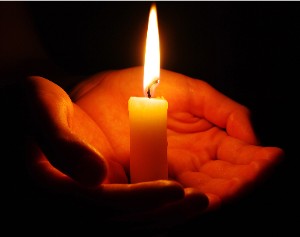 At yesterday’s Sunday Sangha, Christine ended the sitting with one of the few poems by Mary Oliver that, surprisingly, I haven’t often heard as part of a Dharma talk. (Although of course, I have heard this quote from the Buddha.)
At yesterday’s Sunday Sangha, Christine ended the sitting with one of the few poems by Mary Oliver that, surprisingly, I haven’t often heard as part of a Dharma talk. (Although of course, I have heard this quote from the Buddha.)
The Buddha’s Last Instruction
by Mary Oliver
“Make of yourself a light,”
said the Buddha,
before he died.
I think of this every morning
as the east begins
to tear off its many clouds
of darkness, to send up the first
signal–a white fan
streaked with pink and violet,
even green.
An old man, he lay down
between two sala trees,
and he might have said anything,
knowing it was his final hour.
The light burns upward,
it thickens and settles over the fields.
Around him, the villagers gathered
and stretched forward to listen.
Even before the sun itself
hangs, disattached, in the blue air,
I am touched everywhere
by its ocean of yellow waves.
No doubt he thought of everything
that had happened in his difficult life.
And then I feel the sun itself
as it blazes over the hills,
like a million flowers on fire–
clearly I’m not needed,
yet I feel myself turning
into something of inexplicable value.
Slowly, beneath the branches,
he raised his head.
He looked into the faces of that frightened crowd.
